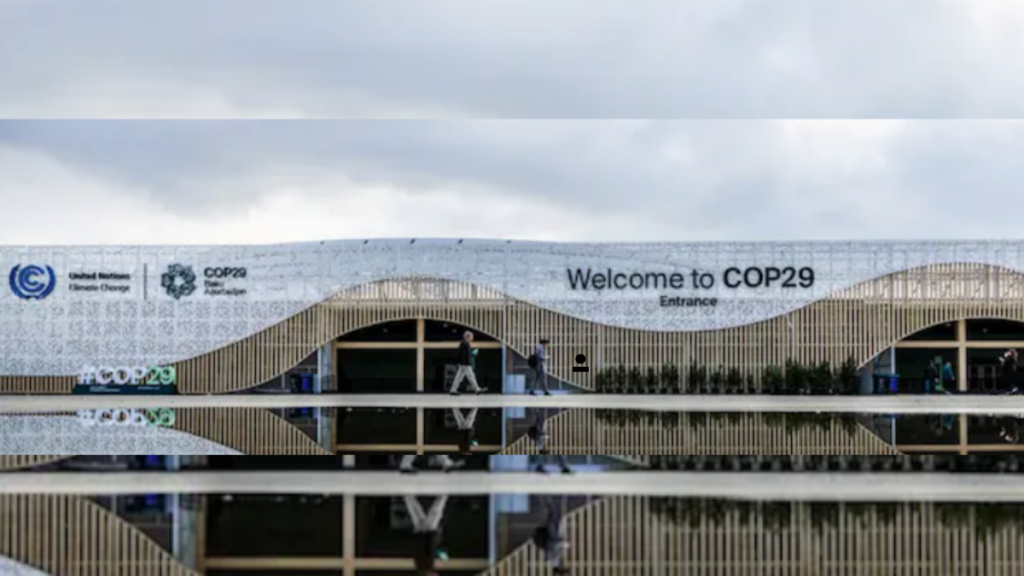Many country delegations were worried that Trump’s victory in the US presidential election on November 5 would impede efforts to limit global warming as the annual UN climate summit got underway in Baku, Azerbaijan, on Monday.
US climate envoy John Podesta said Donald Trump can slow, not stop, the shift away from fossil fuels when he takes office in January, and he urged governments to continue believing in the nation’s commitment to fight global warming.
Many country delegations were worried that Trump’s victory in the US presidential election on November 5 would impede efforts to limit global warming as the annual UN climate summit got underway in Baku, Azerbaijan, on Monday.
Trump has pledged to maximise the nation’s already record-high production of fossil fuels and to once more exclude the United States, the largest historical emitter of greenhouse gases, from international climate cooperation.
“Last week’s outcome in the United States is obviously bitterly disappointing for those of us dedicated to climate action,” Podesta stated during the summit.
“But what I want to tell you today is that even though Donald Trump’s federal government may put climate action on hold, the United States will continue to work to contain climate change.”
He said that investments in solar, wind, and other technologies would continue to be fuelled by President Joe Biden’s historic climate legislation, the Inflation Reduction Act (IRA), which provides billions of dollars in clean energy subsidies. He also said that U.S. state governments would push for emissions reductions through regulation.
None of that, in my opinion, is reversible. Is it possible to slow it down? Perhaps. However, the path is obvious,” he stated.
Trump has pledged to abolish the IRA, but doing so would need a congressional act, which may be difficult to obtain given the backing of certain Republican lawmakers whose districts profit from investments linked to IRAs.
WRANGLING THE AGDA
In addition to the U.S. election, economic issues and the wars in Gaza and Ukraine are competing for attention during the Baku talks.
This makes the summit’s goal of resolving the top agenda item—a deal for up to $1 trillion in climate finance for developing nations annually instead of the original $100 billion target—more difficult.
Simon Stiell, the U.N. climate chief, tried to get things moving.
“Let’s dispense with the idea that climate finance is charity,” he said at the Baku stadium. “Every country, even the biggest and wealthiest, has a vested interest in achieving a bold new climate finance goal.”
It is expected to be the hottest year on record. Extreme weather events, such as drought engulfing South America, Mexico, and the U.S. West, and flooding disasters in Africa, coastal Spain, and the U.S. state of North Carolina, have presented challenges to both rich and poor nations.
However, it was difficult to agree on one of COP29’s initial tasks: the negotiation agenda was approved after more than five hours of delay.
According to four people familiar with the private talks who asked not to be named, the European Union and small island nations had urged countries to talk about how to expand on the agreement last year to move away from fossil fuels.
Fossil fuel manufacturing According to the sources, Gulf states sought to restrict talks to the financial aspects of the COP28 agreement from the previous year.
Countries ultimately agreed to talk about the COP28 agreement, but it was unclear what the main topic of the discussions would be.
They also approved a set of carbon credit quality standards that are considered to be critical to the development of a global carbon market backed by the United Nations to finance projects that reduce greenhouse gas emissions.
And countries sidestepped a spat over trade tensions after China had asked to include concerns about some countries’ trade policies on the COP29 agenda. Beijing backed out of its proposal, opting instead to discuss the matter informally with Azerbaijan during its COP29 presidency.
Trump’s campaign pledge to impose 20% tariffs on all foreign goods and 60% on Chinese goods has made trade a more significant issue for China, which is already subject to EU tariffs.
Many are also concerned that other nations may backtrack on their current climate commitments or reduce their aspirations for the future as a result of the United States’ disengagement.
“Well, the United States is the second-largest emitter,” people will say. It is the world’s largest economy. Why would we not set an ambitious goal for ourselves if they don’t? According to Reuters, Marc Vanheukelen served as the EU’s climate ambassador from 2019 to 2023.
China, the largest emitter in the world today, has a responsibility to increase emissions, according to Podesta, in part by creating an emission reduction plan that supports the 2015 Paris Agreement’s objective of keeping global warming to 1.5 degrees Celsius above pre-industrial levels.
Podesta stated, “I hope they play the important role they have to play.”
While promoting gas as a transition fuel, host Azerbaijan has pushed governments to speed up their transition to clean energy. In 2023, oil and gas revenues made up 35% of its economy, down from 50% two years earlier, and the government predicts that by 2028, these revenues will drop to 22%.
President Ilham Aliyev has called Azerbaijan’s fossil fuel wealth “a gift of God,” and Baku has proposed creating a Climate Finance Action Fund to unintentionally collect up to $1 billion from extractive industries in ten countries, including Azerbaijan.

